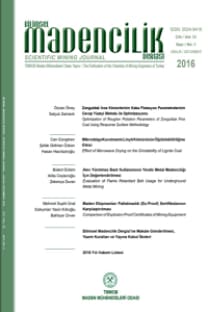Salihli - Sart Plaserlerinde Ağır Mineral Dağılımı ve Değerlendirilmesi
Belli bir oranda M.ö. 6. yy daki Lidya Kralı
Krezüs'ün meşhur hazinelerinin temelini
oluşturmuş Salihli Şart plaserlerinde
son yıllarda yapılan araştırmalar altın
dağılımının düzensiz olduğunu ve
mevcut tenörlerin ekonomik bir değerlendirme
için yeterli almadığını ortaya
koymuştur. Bu çalışmada adı geçen plaserlerdeki
ağır mineraller ve bunların
kütle içindeki dağılımları belirlenmeye
çalışılmıştır. Güdülen ana anaaç düşük
tenörde olduğu bilinen altının değerlendirilmesini
ağır mineral yan ürünleri ile
ekonomiklik kapsamı içine sokabilmek
olmuştur.
Daha önce yapılan araştırmalar altının
1 mm nin altındaki fraksiyonda serbest
halde bulunduğunu, bu tane iriliğinin
üstündeki fraksiyonlardaM altının elde
edilimi için pahalı kırma - öğütme iş
lemlerine gerek bulunduğunu ortaya
koymuştur. Bu çalışmada da plaser kü
mesinin X mm nin altındaki bölümü temel
kabul edilmiş ve bu kütle içindeki
ağır mineral ve altın dağılımı incelenmiştir.
Elde edilen sonuçlan şu şekilde
özetlemek mümkündür :
1. Toplam ham kütlenin %25.31 ini oluş
turan 1 mm nin altındaki plaser kütlesinde
%17.65 oranında, yoğur.ağu
2.96 nin üzerinde bulunan ağır mineraller
mevcuttur.
2. Ağır minerallerin ana kültesini zirkon,
rutil, apatit, hematit, aîmandin
oluşturmaktadır. Ayrıca iz olarak da
harit, kasiterit; ilmenit, limonit, zinober,
pirotin, kalkopirit, pirite rastlanmıştır.
3. Adı geçen minerallerden altının yanında
ekonomik açıdan önemli olabilecek
mineral olarak zirkon, rutil ve
apatit belirlenmiş ve bunların çeşitli
tane fraksiyonlarındaki dağılımları
ortaya konulmuştur. Buna göre I mm
nin altındaki kütlenin ağır mineral
fraksiyonunun
Although they were one of the most important
sources of the King of Lydia Cresus's
gold treasuries in B.C. 6, recent investigations
at Salihli-Sardis placers have
proved the fact that the gold distribution
shows an irregularity and the present
grades are not sufficient for an economical
evaluation.
In this study heavy minerals contained in
the above mentioned placers and their
distribution is tried to be determined. The
main purpose of this study is to put the
low graded gold together with the heavy
mineral by-products in an economical
evaluation.
The previous investigations showed that
the gold with particle size - 1 mm is liberated
in the fractions below 1 mm. But for
coarser fractions expensive communition
processes had to be involved. In this research
the fractions below 1 mm is taken as
a basis and the distribution of heavy minerals
and gold within this are examined.
The obtained results can be outlined as
follows :
1) The placer mass below 1 mm, which
makes up the 23,31 % of the total raw
material, contains 17,65 % heavy minerals
having a density higher than
2.96.
2) Zircon, rutile, apatite, hematite, almandite
make up the basic mass of
heavy minerals. Furthermore barite,
cassiterite, ilmenite, limonite, cinnabar,
pyrrhotite, chalcopyrite, pyrite
have been seen as a trace.
3) Besides gold of the mentioned minerals,
zircon, rutile and apatite is determined
important from the economical
point of view and the distribution
of these in various size fractions
is stated. According to this, he^,vy mineral
fractions of the mass below 1
mm consist of 8.52 % zircon, 4.84 %
rutile and 2,24 apatite. Apart from
these, this heavy mineral mass contains
2 gr/ton gold. The remaining
part of the heavy mineral contains
hematite and almandite.
4) By sieving the placer mass under 1
mm, a mass containing 0,53 gr/ton of
gold and having a grade of 2.02 % zircon,
1.25 •fo rutile, 0.60 % apatite are
obtained. By sampling, it has been
proved that by using simple ways of
sieving gold, zircon, rutile and apatite
can be obtained from this mass
technologically and economically. 2
alternatives were stated for this :
— First alternative is stated as obtaining
gold, zirkon, rutile and apatite by
classifying the placer mass under 1
mm. According to this respect, by
sampling again, the capacity should
be 5 M. ton/yr, of unsieved placer. In
this case with an 80 % output apart
from having nearly 600 kg/yr. of gold,
21.000 ton of zircon, 13.000 ton of rutile,
8.000 ton of apatite concentrates
can be obtained and the income for
a year will probably sum up to 25 million
dollars. The details of the process
and determination of the cost will be
studied in another research.
— In the second alternative the placer
mass is sieved and - 0,315 + 0,063 mm
fraction is subjected to gold production.
Because by this way a mass containing
80 •% gold of the placer mass
and having a gold grade of 1.28 gr/
ton is found.
Under the view of the world examples it
is sure that both of these alternatives are
economical but the question of which to
apply is left for another research. Yet the
first alternative is capital intensive, and
the income is proportionally high, whereas
the second alternative with less investment
it is doubtless to achieve some income.
No matter which alternative is accepted
this study proves the fact that in today's
conditions Salihli - Sardis placers can be
evaluated economically when gold, rutile,
zirkon, apatite is taken into consideration.
- ISSN: 2564-7024
- Yayın Aralığı: Yılda 4 Sayı
- Yayıncı: TMMOB Maden Mühendisleri Odası
